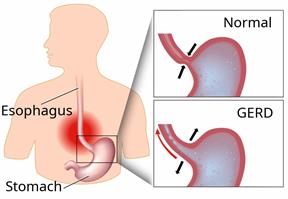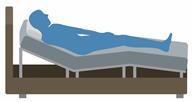GERD in Adults: What to Know

Gastroesophageal reflux (GER) is when acid from your stomach flows up into your esophagus. Your esophagus is the part of your body that moves food from your mouth to your stomach. Normally, food goes down and stays in your stomach to be digested. But with GER, food and stomach acid may go back up.
You may have a disease called gastroesophageal reflux disease (GERD) if the reflux:
Over time, GERD can make small holes called ulcers in the lining of your esophagus.
What are the causes?
GERD is caused by a problem with the muscle between your esophagus and stomach. This muscle is called the lower esophageal sphincter (LES). When it's weak or not normal, it doesn't close like it should. This means food and stomach acid can go back up into your esophagus.
The muscle can be weak if:
What are the signs or symptoms?
-
Heartburn.
-
Trouble swallowing.
-
Pain when you swallow.
-
The feeling of having a lump in your throat.
-
A bitter taste in your mouth.
-
Bad breath.
-
Having an upset or bloated stomach.
-
Burping.
-
Chest pain. Other conditions can also cause chest pain. Make sure you see your health care provider if you have chest pain.
-
Wheezing. This is when you make high-pitched whistling sounds when you breathe, most often when you breathe out.
-
A long-term cough or a cough at night.
How is this diagnosed?
GERD may be diagnosed based on your medical history and a physical exam. You may also have tests. These may include:
How is this treated?
Treatment may depend on how bad your symptoms are. It may include:
Follow these instructions at home:
Eating and drinking
-
Follow an eating plan as told by your provider.
- You may need to avoid certain foods and drinks. These may include:
Coffee and tea, with or without caffeine.
Alcohol.
Energy drinks and sports drinks.
Fizzy drinks or sodas.
Chocolate and cocoa.
Peppermint and mint flavorings.
Garlic and onions.
Horseradish.
- Spicy and acidic foods. These include:
- Citrus fruits and juices. These include:
- Tomato-based foods. These include:
- Fried and fatty foods. These include:
Donuts.
French fries.
Potato chips.
High-fat dressings.
- High-fat meats. These include:
Hot dogs and sausage.
Rib eye steak.
Ham and bacon.
- High-fat dairy items. These include:
Whole milk.
Butter.
Cream cheese.
-
Eat small meals often. Avoid eating big meals.
-
Avoid drinking lots of liquid with your meals.
-
Try not to eat meals during the 2–3 hours before bedtime.
-
Try not to lie down right after you eat.
-
Do not exercise right after you eat.
Lifestyle

-
If you're overweight, lose an amount of weight that's healthy for you. Ask your provider about a safe weight loss goal.
-
Do not smoke, vape, or use nicotine or tobacco.
-
Wear loose clothes. Do not wear things that are tight around your waist.
- When you sleep, try:
-
Try to lower your stress. If you need help doing this, ask your provider.
General instructions
-
Take your medicines only as told.
-
Do not take aspirin or ibuprofen unless you're told to.
-
Watch for any changes in your symptoms.
-
Do not bend over if it makes your symptoms worse.
Contact a health care provider if:
- You have pain all of a sudden in your:
-
You feel sweaty, dizzy, or light-headed all of a sudden.
-
You faint.
-
You have chest pain or shortness of breath.
- You vomit and the vomit is:
-
Your poop is red, bloody, or black.
These symptoms may be an emergency. Call 911 right away.
This information is not intended to replace advice given to you by your health care provider. Make sure you discuss any questions you have with your health care provider.

